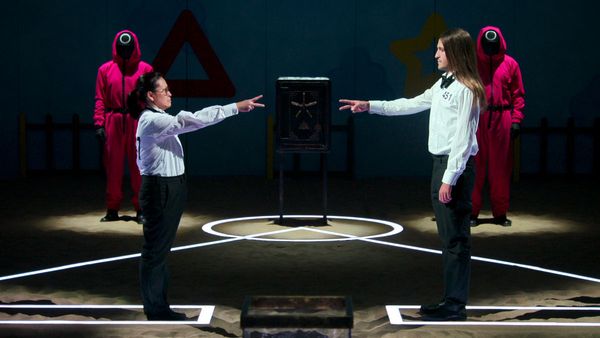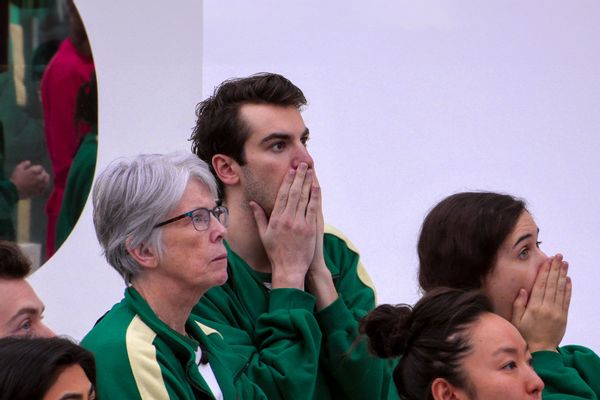More than 23 years before “Squid Game: The Challenge” aired its finale, CBS introduced America to TV’s first grand-scale reality competition “social experiment” with “Survivor.” Sixteen people were dropped into a remote part of Borneo and tasked to deal with exposure to the elements, fend off starvation and complete physical challenges for a shot at $1 million. How would these conditions change them? an enthralled public wondered.
Fourth runner-up Sue Hawk answered that in her infamous finale speech, where seven of Richard Hatch and Kelly Wigglesworth’s longest-lasting peers decide which was more deserving of the ultimate prize.
“This island is pretty much full of only two things: snakes and rats,” Hawk said. “And in the end of Mother Nature, we have Richard the snake, who knowingly went after prey, and Kelly, who turned into the rat then ran around like the rats do on this island, trying to run from the snake.”
She continued: “I feel we owe it to the island’s spirits that we have learned to come to know, to let it be in the end the way that Mother Nature intended it to be: for the snake to eat the rat.”
Whether Hawk or Mother Nature deserves credit for the outcome, Hatch became the show’s first winner – a man viewers came to know and Hawk accurately described as “a very openly arrogant, pompous, human being.”
“Survivor” came down to rodents and reptiles. “Squid Game: The Challenge” was decided by . . . ugh . . . Rock, Paper, Scissors. Challenges modeled after children’s games, along with social experiments and simple elimination rounds drained its 456-strong contestant pool down to Player 451, Phill Cain, and Player 287, Mai Whelan.
 Squid Game: The Challenge (Netflix)And audiences discovered that watching many rounds of Rochambeau is a deadly dull way to determine a $4.56 million jackpot winner. Nevertheless, that is how Mai won this all but senseless season of “Squid Game: Non-Lethal Edition.”
Squid Game: The Challenge (Netflix)And audiences discovered that watching many rounds of Rochambeau is a deadly dull way to determine a $4.56 million jackpot winner. Nevertheless, that is how Mai won this all but senseless season of “Squid Game: Non-Lethal Edition.”
That it was a small miracle that we came to connect with either of them is among a list of criticisms longer than a CVS receipt, foremost being its excision of the original K-drama’s guiding indictment of a capitalist system that thrives on greed and enables the super-rich to view their fellow humans as exploitable units.
Mai’s presence in the earliest episodes cemented our impression of her through others, including former Harlem Wizards player T. J. Stukes (Player 182) who revered Mai as wise and unwisely assumed she felt the same about him. Mai played the part of the caring elder with T.J. and the other men in the game, leading them to view her as harmless. By playing T.J.'s heartstrings he gave her one of the best advantages in the game, allowing allies to take the fall for her until she had none left. By then it didn't matter because she’d made it to the last three standing, which included Sam Lantz (Player 016).
Mai played the part of the caring elder with T.J. and the other men in the game, leading them to view her as harmless.
Lamenting that “The Challenge” missed the point misses that Netflix correctly gambled that audiences would not care. Sure enough, the reality spinoff is currently the top-ranked show on the streaming service, which announced a second season on Thursday. Meanwhile, production on the follow-up season for the scripted "Squid Game" has already been underway.
Desperation made us ache for that drama’s characters. A flair for cunning, meanwhile, edited Mai into the type of victor we could live with, one of a slew of manipulations engineering the outcome, some of them placing the competitors in dangerous situations. (That opening game of “Red Light, Green Light” that supposedly lasted a few minutes actually kept contestants standing in freezing conditions for nine hours.) She played her opponents and the audience in equal measure as a student of human nature and these types of shows.
 Squid Game: The Challenge (Netflix)One aspect of the show the game makers could not have predicted – an Episode 7 twist concocted by the nine women left standing in a group of 31 players. A few of them proposed a gender-based alliance, reasoning that if it were the next test was social, picking each other would be the best way to ensure a woman would make it further than she would otherwise.
Squid Game: The Challenge (Netflix)One aspect of the show the game makers could not have predicted – an Episode 7 twist concocted by the nine women left standing in a group of 31 players. A few of them proposed a gender-based alliance, reasoning that if it were the next test was social, picking each other would be the best way to ensure a woman would make it further than she would otherwise.
It is possible that the people behind the scenes digested this campaign and concocted a “test” to give their plan its best chance to succeed; the subsequent “Allegiance Test” was a convenient requirement to pick a friend to move forward in the game. Regardless of that, it worked . . . eventually.
TJ chose Mai, and Mai chose her next biggest fan . . .Chad Van Horn (Player 286) – decidedly not a woman. For a moment it looked like the outcome would be a straight man beef log basket . . . until the guy Chad chose selected a woman. Then the situation became intriguing – women chose women until the choice fell to Jackie Gonzalez (Player 393), a deaf competitor, who selected friendship over gender. That friend happened to Phill, a queer person, who honored her request to choose a woman, who in turn selected Sam, a gay man.
On it went until the 20-person cut was complete, sewing up nearly half of the available slots for women and three for queer men. Sure, representation matters, as Charles Roquemore (Player 221) announced when he said he would “continue to respect what’s been going here today” before bringing the final woman into the fold.
In pure reality TV consumption terms, however, this gambit ensured that at least one woman would make it to the end. That she ended up being Mai was in part a matter of chance, or the appearance of such. That two queer men stood beside her was another unexpected result of that move.
We need your help to stay independent
We will never know if the 11 men who went home would have also selected Phill, Sam and Charles or any of the women. It also remains a mystery as to whether the dealmaking to navigate the Glass Bridge, where each forward move presented a 50% chance of quite literally dropping out of the game, would have happened with a different group of people. (Bucking the cutthroat outcome Hwang Dong-hyu scripted in the original drama, the contenders agreed on a deal wherein each person would only be responsible for one step, equaling the risk for everyone.)
The “Girls, Gays and Theys” scheme, as Phill dubbed it, is reminiscent of what the Black players on “Big Brother” accomplished in 2021.
What we saw is that five women and four men made it through to the penultimate episode. Two of those men are queer. Two of the women are Black. “The Challenge” is a British production that pulled contenders from 20 different countries, but anyone who watched American reality TV competitions knows that is not the way most socially fueled competitions play out.
Nothing could save “Squid Game: The Challenge” from being a cheap, bitter entertainment. It's based on a moving societal commentary in which characters die graphically and traumatically. Watching “The Challenge” contenders pretend to dramatically expire for the cameras when ink squibs explode on their chests dilutes the tragedy in that.
 Squid Game: The Challenge (Netflix)The surviving contenders’ cheers at the filling piggy bank suspended from their dormitory ceiling only added to the enterprise's moral frigidity. Even the son who beat his mother at the format’s brutal game of marbles can’t stop himself from cheerily pointing out that her defeat, transformed into cash plopping into the pot, was floating above them too.
Squid Game: The Challenge (Netflix)The surviving contenders’ cheers at the filling piggy bank suspended from their dormitory ceiling only added to the enterprise's moral frigidity. Even the son who beat his mother at the format’s brutal game of marbles can’t stop himself from cheerily pointing out that her defeat, transformed into cash plopping into the pot, was floating above them too.
But the “women stick together” turn tightened up a show whose unwieldiness stymied its ability to efficiently deploy the usual hero, villain and loser edits without its fakery showing. That is bound to happen when you try to weave compelling, connective narrative arcs from a field that starts with hundreds of people.
The “Girls, Gays and Theys” scheme, as Phill dubbed it, is reminiscent of what the Black players on “Big Brother” accomplished in 2021 by forming The Cookout, ensuring one of them would be that show's first Black winner in 23 seasons. It may have also boosted Mai’s chances even though she was for herself above all from the moment she cleared “Red Light, Green Light.”
Moreover, it gave a show that made us constantly wonder why it exists something to cling to. A major annoyance in the first few episodes was to watch the close students of “Squid Game” jockey for supremacy, sure in their ability to beat the brutal tests depicted in that 2021 tale. Indeed, this skewed the conditions of "Physical: 100" in favor of its male entrants.
Injecting tests of character, as the producers described them, made it anyone's game while distracting us from the mercenary nature of what both the players and Netflix were engaging in. Only to a degree, since the entire premise of “Squid Game” requires all bonds to break in the end.
Want a daily wrap-up of all the news and commentary Salon has to offer? Subscribe to our morning newsletter, Crash Course.
The women evened the odds as much as they could in a game when success and failure came down to random luck, gifting a morsel of justice to the affair. Directly before that happened, Jackie endured an older entitled man’s bombastic accusation that she was somehow playing her handicap to her advantage, and a cocky younger white man employ a series of microaggressions against his Black female competitor, eventually forcing a stalemate that eliminated both.
 Squid Game: The Challenge (Netflix)Post-alliance, the remaining people strived to be fair, which was noble but silly and salted the beef between Mai and Ashley Tolbert (Player 278), who also strategized ruthlessly on the Glass Bridge, forcing a well-loved competitor to take extra steps and eventually fall before aligning with the majority agreement and taking one, ensuring her safety.
Squid Game: The Challenge (Netflix)Post-alliance, the remaining people strived to be fair, which was noble but silly and salted the beef between Mai and Ashley Tolbert (Player 278), who also strategized ruthlessly on the Glass Bridge, forcing a well-loved competitor to take extra steps and eventually fall before aligning with the majority agreement and taking one, ensuring her safety.
[Mai] played everyone else much more artfully than Richard Hatch did.
Wealth distribution is unequal and unfair for many reasons, as the Korean drama reminded us. These interactions alluded to a few of them. Mai’s success in the wake of all that is not necessarily satisfying as much as it is understandable.
By the competition series’ end we knew she came to the United States from Vietnam as a child refugee, served in the Navy, was disowned after becoming pregnant at 19, and eventually became an immigration adjudicator. These experiences required her to read people and plot her actions accordingly. She may not have demonstrated female solidarity, but one thing women of color know is that such declarations tend to be transactional. Anyway, she played everyone else much more artfully than Richard Hatch did. Two of the people she brazenly betrayed had no idea she was a snake until they watched the show. That’s what it took to win this mess, which is a dark moral to be left with. We’d be foolish to expect anything else.
All episodes of "Squid Game: The Challenge" are streaming on Netflix.
Read more
about "Squid Game"

Shares